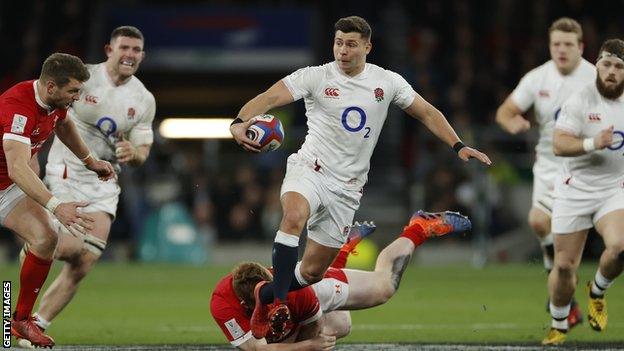Global rugby union calendar Q&A: The main issues before World Rugby meeting
- Published

There is a chance the Six Nations could move to a month or two later in the year in calendar negotiations
The lack of a harmonised global calendar has long been an issue in rugby union, but there is optimism that could soon change.
Bringing together the schedules of northern and southern hemisphere teams will be discussed at a World Rugby meeting on Monday.
But why is a global calendar important, what is being proposed and how could it affect players and major tournaments?
BBC Sport has answered your questions.
Why is this meeting happening?
Even though rugby union has been split into hemispheres since the dawn of professionalism - with the north and south running different season schedules - talk of aligning the calendars is not new.
As far back as 2007 rugby bosses met in Woking (of all places) to discuss a revolutionary restructuring, while in 2017 a summit in San Francisco attempted to bring the hemispheres closer together.
But progress has been slow, until now.
Out of the rubble of the pandemic, a spirit of collaboration and co-operation seems to have emerged, with a six-person cross-hemisphere working group - featuring a representative from Sanzaar, the Six Nations, World Rugby, the International Players' Union, as well as RFU boss Bill Sweeney and WRU chief Martyn Phillips - meeting regularly since March to thrash out a groundbreaking new calendar.
As echoed by Warren Gatland on BBC 5 live on Friday, there is a feeling that this is now or never. While coronavirus has financially dismantled the best laid plans of clubs and unions worldwide, it has also put the game on pause and allowed time for the discussions to take place.
Monday's meeting of the Professional Game Forum will involve figures from all across the game, and while it is not quite being described as make-or-break, it might not be far off.
What is being proposed?
As Gatland says, there are a few different scenarios on the table, but the main objective would be to run the domestic seasons of the north and southern hemispheres concurrently in one calendar year.
The international windows would also be moved, for example the July window would shift to October to allow a longer block of international fixtures in the autumn, meaning the three "windows" would become two.
Games from the Six Nations and the Rugby Championship, along with the October/November block, would then fit into a 'Nations Championship', designed to improve the narrative and boost the commercial potential of the international game.

World champions South Africa won the 2019 Rugby Championship, with Argentina, Australia and New Zealand also competing in the tournament
Will the Six Nations move?
Yes, it is certainly possible. For years this was a non-negotiable, with the Six Nations revelling in its traditional February and March slot in the sporting calendar.
But the mood has changed, with key figures among the home unions accepting that a shift to a month or two later in the year may be required to make this happen.
The Six Nations would then be played at the same time as the Rugby Championship, which may need to expand to six teams.
Many rugby luminaries feel 'if it ain't broke don't fix it' when it comes to the Six Nations, but the home unions will be asked, and it's a big ask, to put the interests of the global game above their own.
How could this impact players?
In the rush to grow and commercialise the game, the interests of the players have often taken a backseat, with administrators hitherto making up any revenue shortfalls by simply staging more matches.
This time, the powers-that-be insist, both privately and publicly, that the voice of the players will be heard.
The presence of a representative from the International Rugby Players (IRP) on the global calendar working group is encouraging, as outlined by IRP board member Brian O'Driscoll on the BBC on Saturday, while sources say the new structure will give clubs and unions a chance to plan rest periods better.
"There have to be clear rules in place on the maximum number of games these players play. They will not be playing more matches, they can't," a leading figure in the discussions told the BBC
On this note, officials insist that the new calendar would not be about more matches, but more meaningful matches.
How will it align with the club game?
The start date of the domestic seasons remains a point of consternation, but whatever the exact details, a shift to playing in the summer months for the northern hemisphere leagues would be necessary.
This will be controversial - traditionalists may be uncomfortable with the prospect of club rugby in July and August rather than December.

The English Premiership could shift to playing in the summer months
It must be stressed this is for the professional game only - community levels would be unaffected - but while some fans will relish the opportunity to watch their teams in dry conditions on a warm summer's evening, others may fear a clash with holidays and the cricket season.
Either way, one of the driving forces behind the proposals is to reduce the overlaps between club and international rugby, and few are likely to dispute the merit in this.
Furthermore, the structure would guarantee longer blocks of uninterrupted domestic action at a time, which should benefit the club game.
Convincing the Top 14 and English Premiership to rip up their existing structure is likely to be one of the main sticking points in the conversation, with French rugby officials already voicing their discomfort with the plans.
How will the women's game be affected?
This is a key question, with World Rugby keen to stress that their commitment to the women's game will not be affected by the damage of the pandemic.
Already, though, there are concerns. England's Premier 15s lacks a title sponsor, while there was unrest in New Zealand over how the women's programme was being overlooked in the clamour to bring back the men's Super Rugby teams.
However it is understood a dedicated World Rugby international women's competition would be an integral part of the new global calendar.
At domestic level, the Premier 15s is likely to run at the traditional time of the year in conjunction with the community game.